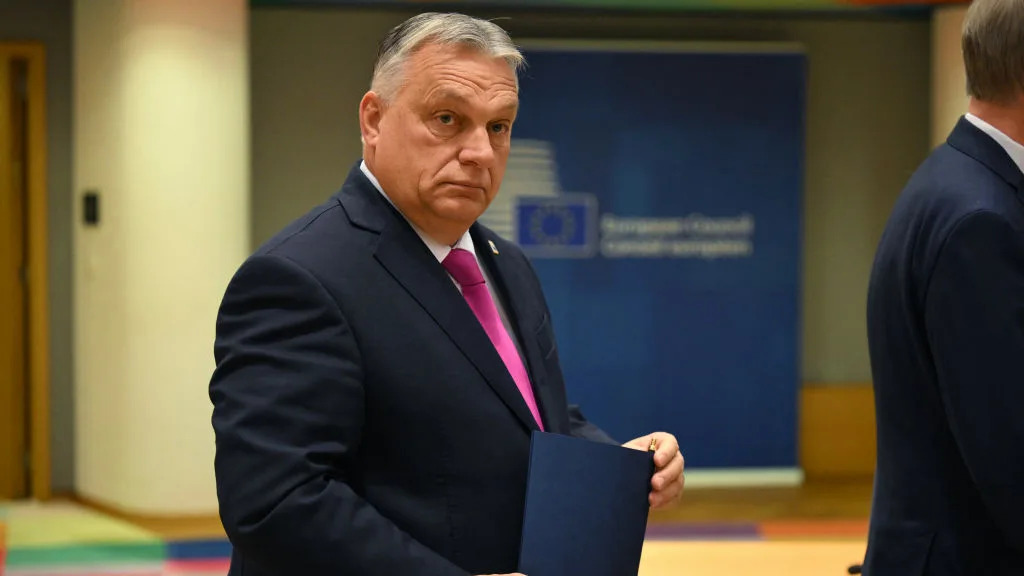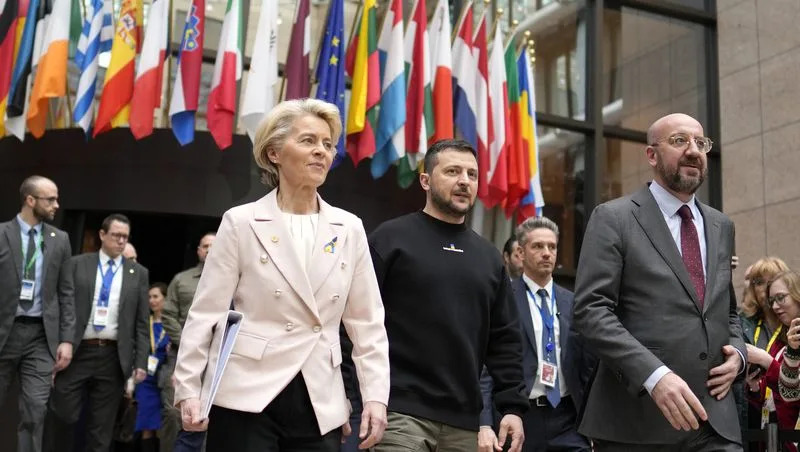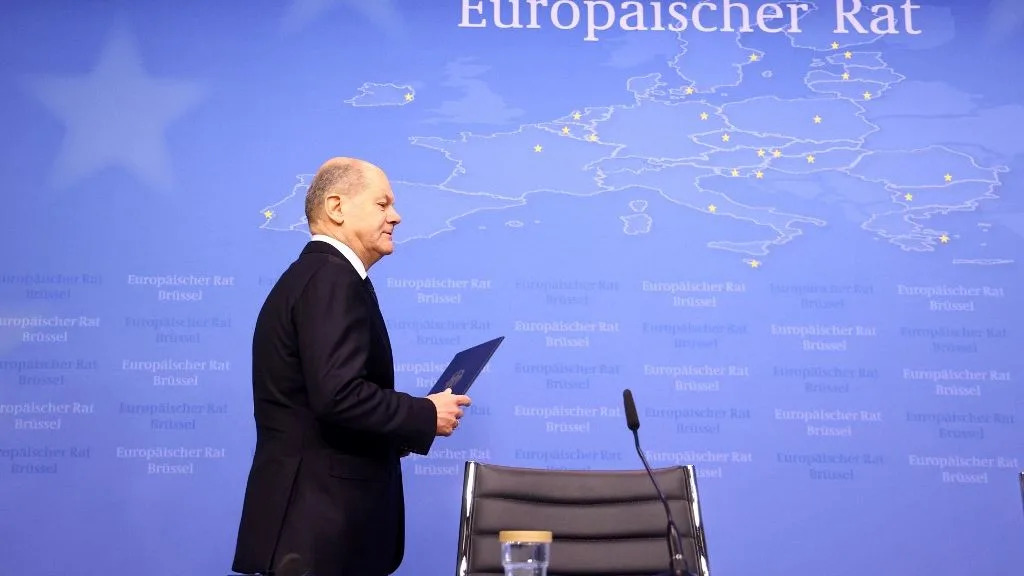The European Union agreed Thursday to open accession talks with Ukraine, in a boost to Kyiv and a blow to Russian President Vladimir Putin, but failed to approve 50 billion euros ($54 billion) in aid to Ukraine after Hungarian Prime Minister Viktor Orbán vetoed the money. The EU also approved membership talks for Ukraine's neighbor Moldova and accepted Georgia as a candidate for joining the bloc.
Hungary's Viktor Orban.
Orbán, Putin's closest ally inside the EU, had threatened to block Ukraine's membership bid from advancing as well. But in a surprise move, he stepped outside the room to allow the other 26 EU leaders to approve Kyiv's upgrade to accession talks unanimously, as required under EU rules. That was German Chancellor Olaf Scholz's idea, Politico reported. "About three hours into deadlocked discussions," Scholz suggested that Orbán "grab a coffee outside the room, perhaps," and the Hungarian leader, already wavering in his opposition, agreed.
Orbán said on social media Thursday night that he had vetoed the funds to Ukraine and still disagreed with "this bad decision" on membership negotiations.
Ukrainian President Volodymyr Zelenskyy — fresh off a disappointing trip to Washington, where Republicans refused to relent on blocking military aid without domestic concessions — celebrated the vote. "This is a victory for Ukraine. A victory for all of Europe. A victory that motivates, inspires and strengthens," he said on X, formerly Twitter. "History is made by those who don't get tired of fighting for freedom."
Ukraine and Moldova applied for EU membership after Russia invaded Ukraine. Putin has reacted poorly to previous efforts by Ukraine to move closer to Europe.
Ukraine is years away from gaining EU membership, and Orbán's advisers suggested he will throw up roadblocks later in the process. European Council President Charles Michel hailed the "historic moment" at an early Friday news conference and said the leaders would reconvene in "early January" to try again on the EU budget and Ukraine aid. If Hungary continues to stand in the way, "we have various tools in our toolbox to ensure that we deliver on our political promises," he added.
Ukraine, which is running low on ammunition and other military tools to continue fighting Russian invaders, "can withstand a small delay in the approval of the funds," The New York Times reports. The Senate still plans to work toward an agreement for aid to Ukraine and Israel, but the House has adjourned for the rest of the year.
EU members vote unanimously to begin membership process for Ukraine
From left, European Commission President Ursula von der Leyen, Ukraine’s President Volodymyr Zelenskyy and European Council President Charles Michel walk together during an EU summit in Brussels.
In a meeting in Brussels on Thursday, European Union leaders voted to “open accession negotiations with Ukraine & Moldova,” according to president of the European Council, Charles Michel, on X.
Hungary has had a strained relationship with Ukraine, and Hungarian Prime Minister Viktor Orbán originally said he would veto the vote, per The New York Times. Orbán has reportedly had a close relationship with Russian President Vladimir Putin, Politico reported.
Orbán walked out of the room before the vote Thursday in a “pre-agreed and constructive manner,” while the remaining 26 leaders voted unanimously to let talks begin, according to BBC.
Later in an X post, Orbán said, “It is a completely senseless, irrational and incorrect decision to start negotiations with Ukraine under these circumstances, and Hungary will not change its position.”
Meanwhile, President Volodymyr Zelenskyy posted on X, “The #EUCO decision to open EU accession negotiations with Ukraine and Moldova has been adopted. I thank everyone who worked for this to happen and everyone who helped. I congratulate every Ukrainian on this day. I also congratulate Moldova and personally @SanduMaiamd.”
The president added, “History is made by those who don’t get tired of fighting for freedom.”
Ukraine’s accession into the European Union has been expedited compared to other countries. It applied for EU membership shortly after Russia invaded in Feb. 2022.
Croatia, the most recent addition to the EU, waited 10 years to join the union. The country applied for EU membership in 2003, negotiated with the union from 2005 to 2011, and became the newest member on July 1, 2013, according to the European Commission.
The vote to begin accession talks doesn’t guarantee Ukraine EU membership, BBC explained. However, it may send a message to Russia and others that Ukraine’s alliances are strong in Europe.
Although Biden’s $60 billion funding request to Ukraine met opposition during Zelenskyy’s visit to Washington D.C. earlier this week, the EU will likely pass 50 billion euros in funding to Ukraine, EU Budget Commission Johannes Hahn said, per Reuters.
EU Summit: Germany's Scholz gets Órban to leave room for decision on Ukraine accession.
EU Summit: Germany's Scholz gets Órban to leave room for decision on Ukraine accession.
This allowed the rest 26 leaders to take the historical decision unanimously. EU rules say unanimity can also be fulfilled even if one leader is absent — meaning Orbán could still say he hadn’t voted in favour.
The unusual move raised eyebrows both in Brussels and beyond.
But the move, in Scholz' own words, cannot become commonplace. "Things can't be solved every time by leaving the room. This is for exceptional cases, like for example, the decision that we have just made," said German Chancellor Olaf Scholz, in a statement to media.
European leaders Ursula von der Leyen and Charles Michel expressed confidence that they will be able to reach the consensus - or even to overcome the position of Viktor Orbán in the future - particularly, in the matter of providing additional 50 billion euros of aid to Ukraine, which Orbán did block.
Nevertheless, Charles Michel summarised the decision to greenlight the European way for Georgia, Moldova and Ukraine as "a very powerful political message" and "a message of hope".





